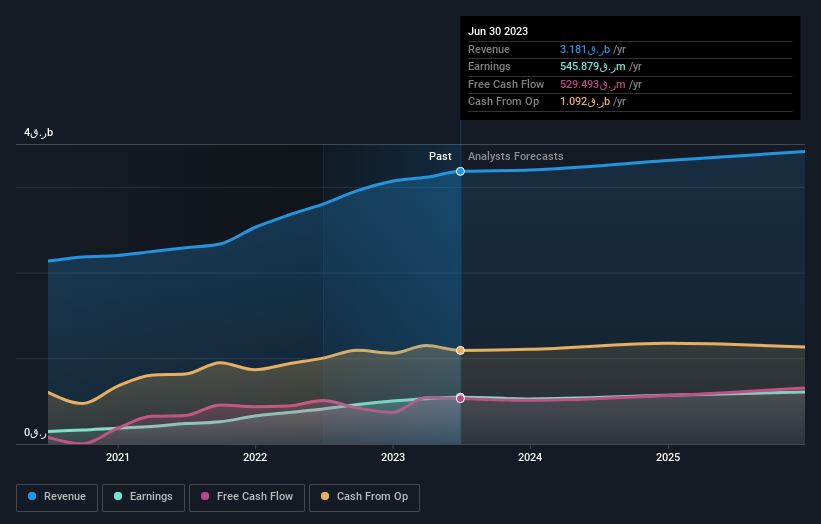- Qatar
- /
- Wireless Telecom
- /
- DSM:VFQS
Individual investors own 33% of Vodafone Qatar P.Q.S.C. (DSM:VFQS) shares but private companies control 45% of the company

Key Insights
- Significant control over Vodafone Qatar P.Q.S.C by private companies implies that the general public has more power to influence management and governance-related decisions
- The top 2 shareholders own 52% of the company
- Institutional ownership in Vodafone Qatar P.Q.S.C is 14%
A look at the shareholders of Vodafone Qatar P.Q.S.C. (DSM:VFQS) can tell us which group is most powerful. We can see that private companies own the lion's share in the company with 45% ownership. Put another way, the group faces the maximum upside potential (or downside risk).
Meanwhile, individual investors make up 33% of the company’s shareholders.
In the chart below, we zoom in on the different ownership groups of Vodafone Qatar P.Q.S.C.
See our latest analysis for Vodafone Qatar P.Q.S.C

What Does The Institutional Ownership Tell Us About Vodafone Qatar P.Q.S.C?
Many institutions measure their performance against an index that approximates the local market. So they usually pay more attention to companies that are included in major indices.
We can see that Vodafone Qatar P.Q.S.C does have institutional investors; and they hold a good portion of the company's stock. This can indicate that the company has a certain degree of credibility in the investment community. However, it is best to be wary of relying on the supposed validation that comes with institutional investors. They too, get it wrong sometimes. It is not uncommon to see a big share price drop if two large institutional investors try to sell out of a stock at the same time. So it is worth checking the past earnings trajectory of Vodafone Qatar P.Q.S.C, (below). Of course, keep in mind that there are other factors to consider, too.

Hedge funds don't have many shares in Vodafone Qatar P.Q.S.C. Our data shows that Vodafone and Qatar Foundation LLC is the largest shareholder with 45% of shares outstanding. Meanwhile, the second and third largest shareholders, hold 7.5% and 5.5%, of the shares outstanding, respectively.
A more detailed study of the shareholder registry showed us that 2 of the top shareholders have a considerable amount of ownership in the company, via their 52% stake.
While it makes sense to study institutional ownership data for a company, it also makes sense to study analyst sentiments to know which way the wind is blowing. Quite a few analysts cover the stock, so you could look into forecast growth quite easily.
Insider Ownership Of Vodafone Qatar P.Q.S.C
While the precise definition of an insider can be subjective, almost everyone considers board members to be insiders. Management ultimately answers to the board. However, it is not uncommon for managers to be executive board members, especially if they are a founder or the CEO.
Most consider insider ownership a positive because it can indicate the board is well aligned with other shareholders. However, on some occasions too much power is concentrated within this group.
We note our data does not show any board members holding shares, personally. Given we are not picking up on insider ownership, we may have missing data. Therefore, it would be interesting to assess the CEO compensation and tenure, here.
General Public Ownership
The general public-- including retail investors -- own 33% stake in the company, and hence can't easily be ignored. While this size of ownership may not be enough to sway a policy decision in their favour, they can still make a collective impact on company policies.
Private Company Ownership
We can see that Private Companies own 45%, of the shares on issue. It's hard to draw any conclusions from this fact alone, so its worth looking into who owns those private companies. Sometimes insiders or other related parties have an interest in shares in a public company through a separate private company.
Next Steps:
I find it very interesting to look at who exactly owns a company. But to truly gain insight, we need to consider other information, too. Take risks for example - Vodafone Qatar P.Q.S.C has 1 warning sign we think you should be aware of.
If you would prefer discover what analysts are predicting in terms of future growth, do not miss this free report on analyst forecasts.
NB: Figures in this article are calculated using data from the last twelve months, which refer to the 12-month period ending on the last date of the month the financial statement is dated. This may not be consistent with full year annual report figures.
New: Manage All Your Stock Portfolios in One Place
We've created the ultimate portfolio companion for stock investors, and it's free.
• Connect an unlimited number of Portfolios and see your total in one currency
• Be alerted to new Warning Signs or Risks via email or mobile
• Track the Fair Value of your stocks
Have feedback on this article? Concerned about the content? Get in touch with us directly. Alternatively, email editorial-team (at) simplywallst.com.
This article by Simply Wall St is general in nature. We provide commentary based on historical data and analyst forecasts only using an unbiased methodology and our articles are not intended to be financial advice. It does not constitute a recommendation to buy or sell any stock, and does not take account of your objectives, or your financial situation. We aim to bring you long-term focused analysis driven by fundamental data. Note that our analysis may not factor in the latest price-sensitive company announcements or qualitative material. Simply Wall St has no position in any stocks mentioned.
About DSM:VFQS
Vodafone Qatar P.Q.S.C
Provides cellular mobile telecommunication, and fixed-line and broadband services in Qatar.
Adequate balance sheet average dividend payer.
Market Insights
Community Narratives



